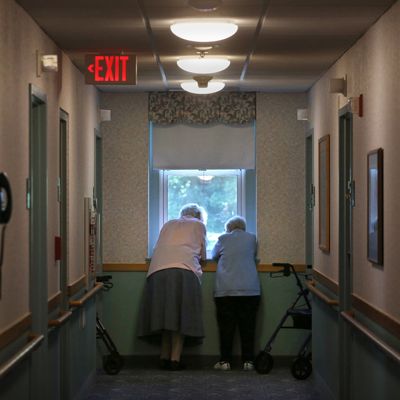
By the time Shella Baker-Trego placed her mother in an assisted-living facility in November, her family’s world had already changed. Carla, 67, could no longer drive herself. She forgot to take her medicine; sometimes she even forgot to eat. Both Baker-Trego and her sister work full time, and with neither available to care for their mom at home in Ohio, assisted living emerged as the only viable solution. These transitions are always difficult for families, but the pandemic raises the emotional stakes. The virus is sweeping through nursing homes and assisted-living facilities, where COVID deaths are 39 percent of the nation’s total. Baker-Trego’s mother had to endure a two-week quarantine that confused her and separated her from both her loved ones and her new neighbors.
“She was crying,” Baker-Trego recalled. “You know, ‘Why am I in prison here? Why did you do this to me?’ It was super-rough.” Now Christmas approaches, and Carla remembers it. She wants to come home, but her daughter thinks it won’t be possible: If Carla leaves her facility for a visit, she’ll have to go through another two weeks in quarantine, inside a room that Baker-Trego says is “the size of somebody’s kitchen.” It’s too depressing, too traumatic. For Carla and her family, Christmas will be different this year.
The holidays won’t be normal for anyone, but nursing-home residents such as Carla will face unusual challenges this year, and so will the workers who care for them. The virus is uniquely deadly for the elderly and for people with disabilities. At the same time, nursing-home staff have suffered high rates of COVID-19 themselves, all while shouldering the consequences of understaffed, underresourced facilities. But workers are trying to make Christmas happen anyway.
“We’ve had to change gears because the holidays are a really big deal here,” said Luis Flores, the director of therapeutic recreation at San Vicente de Paul Nursing Home and Short Term Rehab in the Bronx, ArchCare, which is run by the Archdiocese of New York. In a normal year, Flores’s residents can look forward to all kinds of holiday activities. Residents gather for religious services and meals; children come to visit and sing carols. Because of the pandemic, Flores says that celebrations this winter will be “one-on-one.” Thanks to Bluetooth and Zoom, he added, residents will be able to listen to holiday music provided by staff, and families can call in with FaceTime. “As we speak, we are painting a linen cart that’s going to contain all the residents’ gifts,” he told me. Once the cart looks sufficiently like Santa’s sleigh, someone — “which will probably be me,” Flores admitted — will don both Santa costume and protective gear to deliver presents from room to room.
But the quality of a resident’s holiday will vary wildly, and that was the case before the pandemic stole Christmas. The holidays can be a lonely time for anyone, but especially the elderly. Though Baker-Trego and her family regularly called Carla to keep her company throughout her quarantine, other patients aren’t as lucky. They’ve outlived their loved ones or have distant families. And much depends on the resources at a patient’s disposal. Personal prosperity often determines the level of care and attention a person receives at the end of their life. In some facilities, the task of marking the holidays can fall to the lowest-waged workers available.
Rosalind Reggans, a certified nursing assistant who works in a Chicago long-term-care home, told me that for the last 15 years, she and her co-workers have organized a Secret Santa program for residents. “We let them write down three things that they want, and we give them a $20 or $30 limit,” she explained. “Most of the time they don’t want very much. Socks or a radio, stuff like that.” The staff buy cookies and put up Christmas decorations, anything to make the season more cheerful for residents. Catholic Charities used to bring gifts, she said, but they stopped three years ago. Since then, workers have paid for presents out of their own pockets. “We sacrifice,” she said. She likes to play scratch-off lottery tickets for money to spend on her residents.
A member of the Service Employees International Union, Reggans went on strike earlier this year over a lack of hazard pay and an ongoing staffing crisis at nursing homes operated by Infinity Healthcare Management. Striking workers won a small raise and a better contract, just in time for them to pitch in for the much-anticipated Secret Santa event. “When I came off strike, I had two of them tell me, ‘Ros, I’ve already got my list,’” Reggans said.
But Secret Santa will go on as usual. Residents will get special holiday meals in their rooms, and workers will do the best they can to bring the holidays to them. But Reggans worries that their spirits will be difficult to lift. Many have lost friends and roommates to the virus, and loneliness is settling in. “The majority of them are so depressed,” she said, “and there’s really nothing you can do.” Back in New York City, Flores painted a mural in the lobby of the home where he works. It shows St. Vincent de Paul with four of the home’s longtime residents, who passed away this year. “They’ll be memorialized for a long time,” he said.
Families, meanwhile, are bracing for difficult conversations. Baker-Trego says her mother is already asking about what gifts to buy the family’s children. “I know she wants to come home, and she’s determined to come. But I feel like she’ll be punished for doing that,” she said.






























